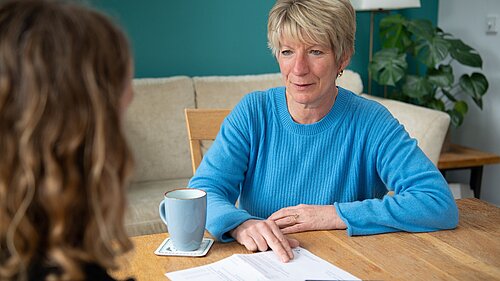The true cost of Liz Truss Energy Policy

Pippa taking to a local resident about rising bills
Recent months have seen soaring energy prices coupled with the highest inflation in 40 years, people across the country unable to meet their basic needs and businesses struggling to keep their doors open. The new package of government support is therefore long overdue, but what is the true cost of the measures announced by our new Prime Minister? Will it help people enough, and how will we pay for it in the longer term?
Under new support measures the typical household will pay £2,500 annually for their energy bills, around a £1,000 cut to the £3,500 predicted average bill from October. But £2500 is still double last October's price cap and we know that many families faced terrible decisions last winter choosing between keeping homes warm or putting food on the table. For those on lowest incomes, the government is silent on how welfare will help- with no sign of the benefits freeze being lifted despite inflation (in fact more restrictions on benefits were announced in today’s fiscal statement). The Lib Dems are calling for additional support by doubling the Warm Homes Discount to £300 for all those on Universal Credit.
There are also gaping inequalities with how much people are being helped. Many families across rural South Cambridgeshire are reliant on oil for heating their homes. The £100 one-off support payment they will receive is nothing against an, on average, £1500 price rise - and filling up the tank for winter is a one- off cost which has to be paid all at once. Whilst tax cuts are announced for the rich and bankers given massive handouts, the help for those who most need it is ill targeted and simply not enough.
And how will we pay for it? The windfall tax (long called for by the Lib Dems) on oil and gas companies introduced by Rishi Sunak was coupled with significant tax reductions for companies investing in new oil and gas projects. Liz Truss could have corrected this, but instead the bill will be paid by the British tax payer. Our children will pay, whilst oil and gas companies keep their record breaking profits.
And what of the environmental cost? Truss’s strategy for long term energy security is heavily on fossil fuels and is alarmingly short sighted. Fracking (which even the founder of fracking firm Cuadrilla has said is not a viable solution in the UK) and getting “the last drop of oil and gas from the North Sea” will not give us cheaper energy but it will stop the UK from meeting its net zero targets. In appointing Jacob Rees Mogg, a well-known climate change sceptic, as energy secretary Liz Truss has made it clear that Tory leadership support for our Net Zero commitments has waned. It is a complete misconception that helping people with bills and tackling climate change are mutually exclusive. In bending to the far right of her party, Liz Truss has missed a massive opportunity to take ambitious action on energy that would help deliver a sustainable energy supply and a sustainable future for our children.
The Lib Dems are calling for a fully implemented windfall tax on oil and gas giants to fund support measures, to freeze domestic energy prices at where they will be before the October rise and double the warm homes discount to help the most vulnerable. Renewables, as shown by our visionary wind turbine policy, are the cheapest form of energy and need to be a much bigger part of the solution to tackle energy supply and climate change together. And time and time again the Government has ignored our calls for a mass insultation programme to cut bills and reduce dependence on fossil fuel. Between 2012 and 2019 there was an 85% decline in home insulation installations. And so we head into winter with cold homes and cold dread thinking about the planet we will be leaving for future generations.
But we will not give up! Within hours of Truss becoming Prime Minister, more than 100 private and public sector organisations wrote to her calling on the government to, whilst ramping up immediate support to help people pay their energy bills, put climate change and nature at the top of their agenda. This came just hours after the Climate Change Committee (CCC) and the National Infrastructure Commission (NIC) wrote to the Prime Minister calling for new policy interventions promoting renewable energy, buildings efficiency and low-carbon heating to respond to the energy crisis. There is a growing and widening collation that will work tirelessly to make sure the Tory government do more to help with cost of living and do not renege on UK climate commitments. The Liberal Democrats stand with them. For me personally, tackling these challenges has been my life’s work. I will fight for a just transition to net zero- to insulate our homes, decarbonise our transport and our workplaces, and restore nature across our towns and villages, to improve people’s lives and fight climate change.
Caudrilla fracking site in Lancashire closed after a series of earth tremors.
